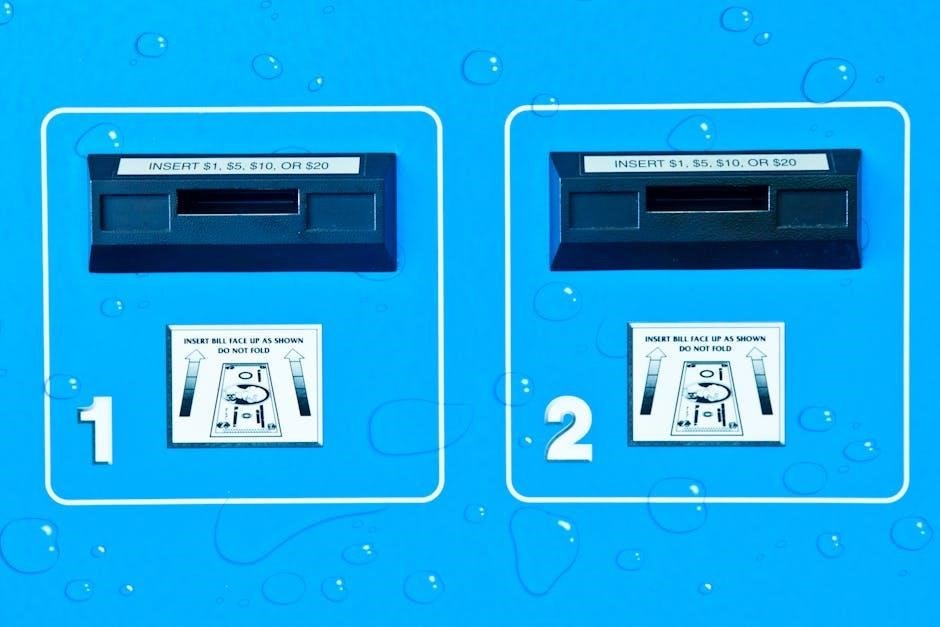Overview of NJ K-1 Instructions
The NJ K-1 form provides detailed instructions for reporting income‚ deductions‚ and credits for partnerships‚ S corporations‚ estates‚ and trusts under New Jersey tax law.
The NJ K-1 form is a tax document used by partnerships‚ S corporations‚ estates‚ and trusts to report each partner’s or beneficiary’s share of income‚ deductions‚ and credits. It is essential for tax compliance‚ ensuring accurate reporting under New Jersey law. The form provides detailed allocations‚ helping taxpayers understand their obligations and file correctly.
1.2 Purpose of the NJ K-1 Schedule
The NJ K-1 schedule serves as a vital tool for pass-through entities to allocate income‚ deductions‚ and credits to partners or shareholders. Its primary purpose is to ensure accurate tax reporting under New Jersey law‚ providing each taxpayer with their specific share of financial data. This enables individuals to correctly file their state tax returns‚ adhering to compliance standards and avoiding potential discrepancies.
Key Components of the NJ K-1 Form
The NJ K-1 form includes taxpayer information‚ partner’s share of income‚ deductions‚ credits‚ and specific line-by-line instructions for accurate tax reporting and compliance with New Jersey tax laws.
2.1 Taxpayer Information and Signature Requirements
The NJ K-1 form requires the taxpayer’s name‚ address‚ and Social Security Number or Employer Identification Number (EIN). The form must be signed and dated by the taxpayer or authorized representative. Partnerships and S corporations must provide Schedule NJK-1 to each partner or shareholder‚ ensuring accurate reporting of their share of income and deductions. Nonresident partners must attach Schedule NJK-1 to claim credits for taxes paid on their behalf. The form must be submitted by the tax filing deadline‚ typically April 15th‚ or October 15th with an extension. Failure to include required signatures or dates may result in processing delays or penalties. Ensure all taxpayer information is accurate to avoid errors or compliance issues.
2.2 Partner’s Share of Income‚ Deductions‚ and Credits
The NJ K-1 form details each partner’s share of income‚ deductions‚ and credits‚ which must be reported on their individual tax return. Partnerships and S corporations itemize these amounts‚ including federal adjustments and New Jersey-specific allocations; Nonresident partners must attach Schedule NJK-1 to claim credits for taxes paid on their behalf. Ensure accurate reporting to avoid discrepancies and comply with state tax requirements.
2.3 Specific Line-by-Line Instructions
Line 1 requires reporting the partner’s contribution to a 401(k) plan‚ with excess federal limits taxable. Line 3 details S corporation income/loss from Part III‚ line 8 of Schedule K. Column A reflects New Jersey-specific allocations‚ while Column B includes federal adjustments. Ensure accurate entry of these amounts to avoid reporting errors and maintain compliance with state tax regulations. Proper documentation is essential.
Instructions for Partnerships and S Corporations
Partnerships and S corporations must provide Schedule NJK-1‚ detailing each partner’s or shareholder’s share of income‚ deductions‚ and credits under New Jersey tax law.
3.1 Reporting Partnership Income on Schedule NJK-1
Partnerships must report each partner’s share of income‚ deductions‚ and credits on Schedule NJK-1. Line 1 details allocated income‚ while Line 2b specifies nonconsenting members’ tax shares. Ensure accurate reporting to comply with New Jersey tax law and provide partners with necessary details for their personal returns. Proper completion avoids delays and ensures compliance with state tax requirements.
3.2 S Corporation Shareholder’s Information and Allocations
S corporations must provide Schedule NJK-1 to each shareholder‚ detailing their share of income‚ deductions‚ and credits. Shareholders report this information on their personal tax returns. Line 1 reflects allocated income‚ while Line 8 from Part III of Schedule K specifies New Jersey items. Nonresident shareholders must attach Schedule NJK-1 to claim credits for taxes paid on their behalf‚ ensuring compliance with state tax requirements.
Special Instructions for Estates and Trusts
Estates and trusts must report beneficiaries’ shares of income and deductions on Schedule NJK-1‚ ensuring compliance with New Jersey tax requirements for pass-through entities.
4.1 Beneficiary’s Share of Income and Deductions
Estates and trusts must report each beneficiary’s share of income‚ deductions‚ and credits on Schedule NJK-1. Beneficiaries are required to include their allocated amounts on their personal tax returns. Line 1 specifies the beneficiary’s share of income‚ while Line 3‚ Column A‚ details contributions to retirement plans. Excess contributions beyond federal limits remain taxable under New Jersey law. Ensure accurate reporting to avoid compliance issues. Attach required documentation to prevent filing delays.
4.2 Reporting Requirements for Estates and Trusts
Estates and trusts must file Schedule NJK-1 with their NJ-1040 return‚ reporting income‚ deductions‚ and credits allocated to beneficiaries. Line 1 specifies the beneficiary’s share of income‚ while Line 3A details retirement contributions. Nonresident beneficiaries may require additional documentation. Ensure accuracy in reporting to avoid penalties and comply with New Jersey tax laws. Attach required documents to support claims and prevent filing issues.
Tax Credits and Exemptions
The NJ K-1 form allows for tax credits like the Fuel Tax Credit (Code C) and Qualified Rehabilitation Expenditures (Code D)‚ providing exemptions for specific eligible activities and expenses.
5.1 Fuel Tax Credit Information
The Fuel Tax Credit (Code C) on the NJ K-1 form applies to certain fuel purchases used in business operations. Eligible entities can claim a credit against their New Jersey tax liability for qualified fuel expenses. Proper documentation‚ such as receipts and usage records‚ must be maintained to support the claimed credit amount. This credit helps reduce taxable income for businesses and partnerships.
5.2 Qualified Rehabilitation Expenditures
Qualified Rehabilitation Expenditures (Code D) are eligible for tax credits under New Jersey law. These expenditures relate to the rehabilitation of historic buildings or certain business properties. The credit applies to expenses incurred for restoring or adapting structures‚ provided they meet specific criteria. Claiming this credit requires detailed documentation‚ and it must be reported on the NJ K-1 form to ensure proper tax compliance and benefit eligibility.
Filing Requirements and Deadlines
Schedule NJK-1 must be attached to the NJ-1040 return‚ ensuring compliance with all filing deadlines‚ typically aligned with the standard tax filing due date.
6.1 Filing Schedule NJK-1 with the NJ-1040 Return
Attach Schedule NJK-1 to the NJ-1040 return‚ ensuring all partner or shareholder information aligns with New Jersey tax law. Use electronic filing for accuracy and efficiency‚ especially for complex returns. Verify Line 1 for allocated income/loss and ensure nonresident partners attach necessary documentation for tax credits. Each partner must receive a copy for their records.
6.2 Deadline for Submitting the NJ K-1 Form
The NJ K-1 form must be submitted with the NJ-1040 return by April 15 for most taxpayers. Nonresident partners must attach Schedule NJK-1 to claim credits for taxes paid. Extensions require Form NJ-630‚ but this doesn’t extend the deadline for filing the K-1.
How to Obtain and Complete the NJ K-1 Form
The NJ K-1 form can be downloaded from official New Jersey tax websites or completed using tax software. Ensure accuracy by following line-by-line instructions and utilizing online tools for efficient filing.
7.1 Downloading the Form from Official Sources
Visit the official New Jersey tax website to download the NJ K-1 form. Ensure you use the correct version for the tax year; The form is available in PDF format and can be printed or saved for completion. Always verify the form’s authenticity to avoid errors or delays in filing. Official sources guarantee compliance with state tax regulations.
7.2 Completing the Form Using Tax Software
Use tax software like TurboTax or H&R Block to complete the NJ K-1 form efficiently. Import data from federal forms to populate fields automatically. Follow step-by-step guidance for accuracy. Ensure all income‚ deductions‚ and credits align with New Jersey tax rules. Verify entries before submission. E-file for faster processing. Double-check calculations to avoid errors and ensure compliance with state tax regulations.
Common Mistakes to Avoid
Ensure accurate reporting of income‚ deductions‚ and credits. Avoid missing signatures or dates on the form. Double-check all entries to prevent errors in tax filings.
8.1 Incorrect Reporting of Income or Loss
Incorrectly reporting income or loss on Schedule NJK-1 can lead to tax errors. Ensure all figures align with federal and state adjustments. Verify calculations for accuracy‚ especially in allocations. Any discrepancies may result in compliance issues or delays in processing. Always cross-reference with federal K-1 forms and New Jersey-specific guidelines to maintain precision in reporting.
8.2 Missing Signature or Dates
Missing signatures or dates on the NJ K-1 form can delay processing and result in compliance issues. Ensure the taxpayer signs and dates the form on line 6. Failure to include these details may lead to rejected submissions or additional scrutiny. Always verify that all required fields are completed accurately before filing to avoid potential penalties or processing delays.

Reconciliation and Additional Worksheets
The GIT-9P form is used for income reconciliation‚ ensuring accuracy in reported earnings. Worksheet A handles federal adjustments‚ aligning state filings with federal returns. These tools help verify discrepancies and ensure compliance with tax regulations‚ making the filing process smoother and more accurate for taxpayers.
9.1 Using GIT-9P for Income Reconciliation
The GIT-9P form is essential for reconciling federal and New Jersey income calculations. It ensures accuracy by detailing adjustments between federal taxable income and state-specific earnings. Key fields include federal taxable income‚ New Jersey modifications‚ and credits. This form is crucial for verifying discrepancies and aligning federal and state returns. It must be filed alongside Schedule NJK-1 to ensure compliance with tax regulations.
9.2 Completing Worksheet A for Federal Adjustments
Worksheet A is used to reconcile federal adjustments with New Jersey tax requirements. It details items like depreciation‚ income exclusions‚ and other federal-to-state differences. Taxpayers must list each adjustment‚ ensuring alignment with New Jersey tax rules. This worksheet is crucial for accurately reporting federal items that differ under state law‚ preventing discrepancies and ensuring compliance with tax filing obligations.

Nonresident Partner Considerations
Nonresident partners must attach a copy of Schedule NJK-1 to claim credits for taxes paid on their behalf‚ ensuring compliance with New Jersey tax regulations.
10.1 Attachments Required for Nonresident Partners
Nonresident partners must attach a copy of Schedule NJK-1 to their NJ-1040 return to claim credits for taxes paid on their behalf; This ensures proper documentation of their share of income and deductions under New Jersey tax law‚ facilitating accurate reporting and compliance with state tax regulations.
10.2 Claiming Credits for Taxes Paid on Behalf
Nonresident partners can claim credits for taxes paid on their behalf by including Schedule NJK-1 with their NJ-1040 return. This ensures they receive proper credit for taxes withheld or paid by the partnership‚ aligning with New Jersey tax regulations and promoting accurate reporting and compliance for nonresident partners.
Basis of Partner’s Ownership
The basis reflects a partner’s capital contributions and ownership share‚ adjusted for federal limits‚ ensuring accurate reporting of income and deductions on Schedule NJK-1.
11.1 Capital Ownership and Contributions
Capital ownership refers to a partner’s initial investment and retained earnings‚ forming the basis of their ownership share. Contributions include both cash and property‚ which increase the partner’s basis‚ reported on Schedule NJK-1. These contributions are essential for determining each partner’s share of income‚ deductions‚ and credits‚ ensuring accurate tax reporting under New Jersey law.
11.2 Adjustments to Basis for Federal Limits
Adjustments to a partner’s basis are necessary to comply with federal limits‚ ensuring alignment with IRS regulations while accounting for New Jersey-specific tax rules. These adjustments reflect items like depreciation differences‚ income allocations‚ and liability assumptions‚ detailed on Schedule NJK-1. Accurate basis adjustments prevent overreporting or underreporting of taxable income‚ maintaining compliance with both federal and state tax authorities.
Special Instructions for Schedule K-1 (Form 1065)
Schedule K-1 (Form 1065) requires accurate reporting of income‚ deductions‚ and credits for partnerships under New Jersey tax law‚ ensuring compliance with federal and state regulations.
12.1 Total Nonconsenting Members’ Share of Tax
Nonconsenting members’ share of tax is calculated by multiplying the amount in Column J by 4.05%. This applies to corporate members or partners subject to New Jersey corporation business tax‚ ensuring accurate distribution of tax liabilities among nonconsenting entities. Proper reporting is essential to maintain compliance with state regulations and avoid discrepancies in tax filings.
12.2 Calculating Column K Entries
Column K entries require calculating each nonconsenting corporate member’s or partner’s share of New Jersey corporation business tax. Multiply the amount in Column J by 4.05% to determine the tax liability. Ensure accurate entry for each member‚ as this directly impacts their tax reporting obligations. Proper calculation is essential for compliance with state tax regulations and avoiding filing discrepancies.

Electronic Filing and Online Services
The New Jersey Online Filing Service simplifies tax submissions‚ allowing easy generation of Schedule NJK-1 and other forms; Use this service to streamline your tax filing process.
13.1 Using New Jersey Online Filing Service
The New Jersey Online Filing Service offers a user-friendly platform to file tax returns efficiently. It supports the generation of Schedule NJK-1 and other required forms‚ ensuring compliance with state tax laws. The service provides step-by-step guidance‚ secure submission options‚ and real-time updates. It also includes tutorials for first-time filers‚ making the process straightforward and accessible for all taxpayers.
13.2 Generating Schedule NJK-1 in ELF
Electronic Filing (ELF) allows users to generate Schedule NJK-1 efficiently. The system imports data directly from tax software‚ ensuring accuracy. Users can review and edit entries before submission. ELF automatically calculates totals and applies New Jersey tax law. It also provides a summary of completed forms for easy review. This method streamlines the filing process‚ reducing errors and saving time for both individuals and tax professionals.

Administrative Guidance and Circulars
This section provides administrative resources‚ including historical circulars and recent updates‚ to guide taxpayers and practitioners on NJ K-1 compliance and accurate reporting.
14.1 Historical Circulars and Assessments
Historical circulars offer guidance on NJ K-1 compliance‚ providing insights into past interpretations of tax laws and assessments. These documents‚ such as the 2013 circular‚ outline administrative instructions for income tax officers‚ ensuring consistent application of regulations. They remain valuable resources for understanding the evolution of NJ K-1 reporting requirements and maintaining accurate tax filings.
14.2 Recent Updates and Changes
Recent updates to NJ K-1 instructions include clarifications on fuel tax credits and qualified rehabilitation expenditures. Nonresident partners must now attach Schedule NJK-1 to claim tax credits. Additionally‚ updates reflect changes in reporting requirements for S corporations and partnerships‚ ensuring compliance with current New Jersey tax laws and regulations. These updates aim to streamline the filing process and improve accuracy for taxpayers.

Contact Information for Assistance
For questions or assistance‚ contact the New Jersey Division of Taxation at (609) 292-6400 or visit their official website for forms and support.
15.1 Reaching Out for Form Requests
To request the NJ K-1 form‚ contact the New Jersey Division of Taxation at (609) 292-6400 or visit their official website. You can also mail your request to the address listed on their site. Ensure to specify the tax year and type of form needed‚ such as Schedule NJK-1 for partnerships or S corporations. Include your name‚ tax ID‚ and mailing address for prompt processing.
15.2 Reporting Issues or Errors
If you encounter issues or errors with the NJ K-1 form‚ contact the New Jersey Division of Taxation at (609) 292-6400 or use their online inquiry form. Provide details such as your tax ID‚ form number‚ and a description of the issue. Written correspondence can be mailed to the address listed on their website. Include your contact information for a prompt response.
Accurate completion of the NJ K-1 form ensures compliance with New Jersey tax laws‚ avoiding penalties and ensuring proper reporting of income‚ deductions‚ and credits for all parties involved.
16.1 Final Tips for Accurate Filing
Double-check all entries for accuracy‚ ensure signatures are included‚ and verify calculations. Use tax software for efficiency and consult official sources for updates. Attach required schedules and ensure compliance with New Jersey tax laws to avoid delays or penalties.
16.2 Importance of Compliance
Compliance ensures adherence to New Jersey tax laws‚ avoiding penalties and fines. Accurate reporting maintains trust and integrity with tax authorities. Timely filing and correct documentation are crucial for seamless processing. Compliance fosters a smooth tax experience‚ supporting both individual and business financial health.



